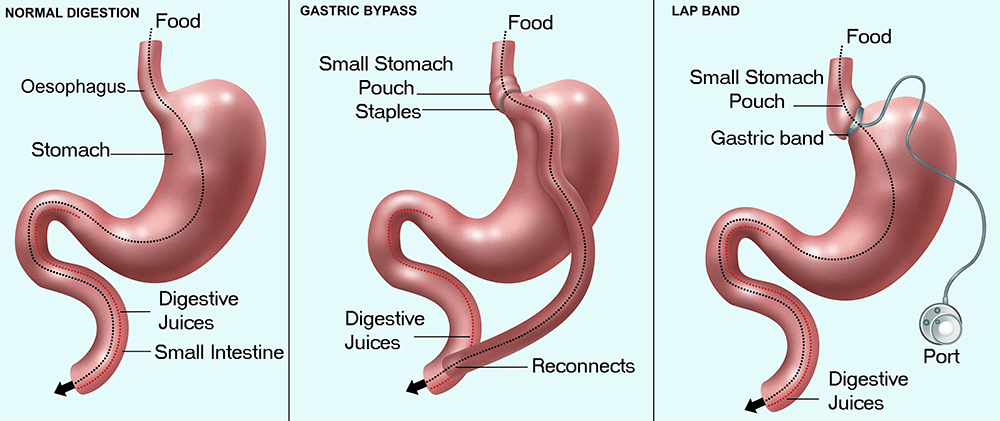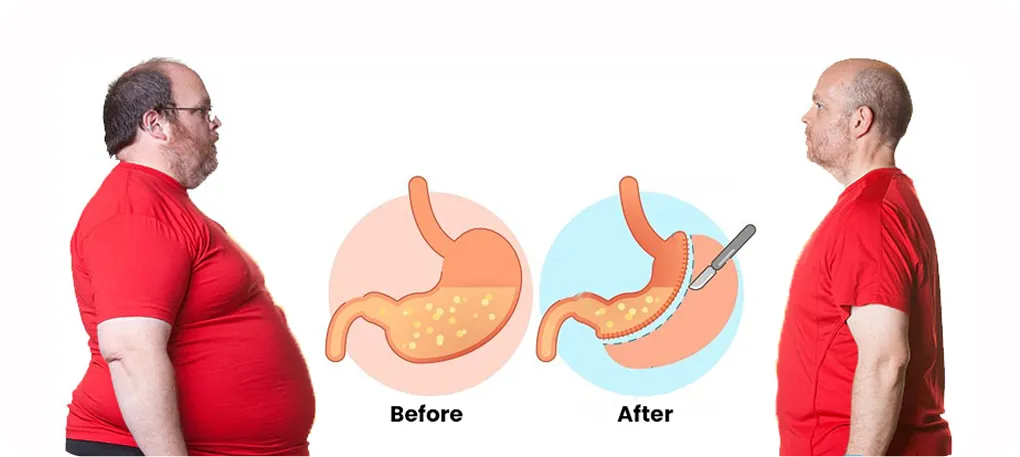What is bariatric surgery
Bariatric surgery refers to surgical procedures designed to help with long-term weight loss in people with obesity, especially when diet, exercise, and medications haven’t worked.
It often also brings improvement (or remission) in comorbidities like type 2 diabetes, hypertension, sleep apnea, fatty liver, etc.
The surgeries generally work by restricting how much food the stomach can hold, and/or reducing absorption of nutrients by bypassing part of the gastrointestinal tract, or by hormonal/metabolic effects.
Common types include:
Sleeve gastrectomy (gastric sleeve)
Gastric bypass (e.g. Roux-en-Y)
Mini gastric bypass / one anastomosis gastric bypass
Adjustable gastric banding (less common nowadays)
Biliopancreatic diversion with duodenal switch
Other newer or hybrid methods (depending on the center)
Bariatric surgery in Shiraz: What is offered
In Shiraz, several hospitals and centers provide bariatric surgery. Some relevant local details:
Ghadir Hospital and Shahid Faghihi Hospital (affiliated with Shiraz University of Medical Sciences) are used as referral centers for obesity surgery. One study comparing sleeve gastrectomy (SG) vs SASI bypass was done there.
Brieflands
Mother & Child (Madre va Koodak) Ghadir Hospital in Shiraz offers bariatric surgery and metabolic surgery services. They list procedures such as sleeve, bypass, mini bypass, and gastric banding.
Shiraz MCH Hospital
Surgeons in Shiraz perform minimally invasive (laparoscopic) procedures (i.e. with small incisions) for many patients.
Shiraz MCH Hospital
Research from Shiraz’s surgical centers contributes to the academic literature (e.g. effects of sleeve vs Roux-en-Y)
It has also been observed that among patients preparing for bariatric surgery in Shiraz, deficiency of vitamin D is highly prevalent and often remains after surgery, meaning nutritional follow-up is crucial.
Liebert Publishing
Thus, the infrastructure, expertise, and clinical research in Shiraz for bariatric surgery are reasonably developed.
Who might be a candidate & when it is considered
Typical criteria (which may vary somewhat by center and country) include:
Body Mass Index (BMI) ≥ 40 (morbid obesity), or
BMI ≥ 35 with serious obesity-related comorbidities (e.g. type 2 diabetes, hypertension, sleep apnea)
Failed attempts at sustained weight loss via non-surgical means (diet, exercise, medical therapy)
Comprehensive evaluation of medical, nutritional, psychological suitability
Absence of contraindications (e.g. severe psychiatric disease, certain gastrointestinal disorders, inability to adhere to follow-up, high operative risk)
In Shiraz’s academic centers, decisions are often made by a multidisciplinary committee (surgeon, nutritionist, psychologist) in consultation with the patient.
How the surgery is done & what to expect
Most surgeries are done laparoscopically (minimally invasive), using several small incisions, insertion of laparoscopic instruments, etc
For instance, in Shiraz, sleeve gastrectomy or SASI bypass procedures have been performed under these protocols.
Brieflands
Hospital stay may vary depending on the procedure, patient condition, and center policies.
Postoperative recovery includes dietary progression (liquids → purees → soft → normal), vitamin/mineral supplementation, monitoring, lifestyle changes (diet, exercise), and regular follow-up.
Because these surgeries alter digestion or absorption, nutritional deficiencies (iron, B12, vitamin D, calcium, etc.) are possible and common. As noted earlier, vitamin D deficiency is especially common in the Shiraz patient population
Risks, complications & challenges
As with any surgery, there are risks: bleeding, infection, leaks at the surgical connections, anesthesia complications, etc.
Over time there may be insufficient weight loss or weight regain. A recent study in Iran (Tehran / Shiraz) found about 8% of cases exhibited “insufficient weight loss” (IWL). Predictors included older age, higher baseline BMI, diabetes, and sleeve procedure.
Nutritional deficiencies (iron, B12, calcium, vitamin D, etc.) are common, especially if supplementation and monitoring are inadequate.
Psychological adjustment: eating behavior, relationship with food, possible depression/anxiety, body image issues (especially with excess skin).
The need for lifelong follow-up, including nutritional monitoring, supplementation, and possibly revisional surgery if problems arise
Costs & practical considerations
Costs vary depending on hospital, surgeon, procedure type, and additional services (preoperative workup, postoperative care, supplements, etc.).
In Iran, non-Tehran cities (like Shiraz) may offer somewhat lower costs compared to capital centers, but still with high quality in many places. Some agencies offering medical tourism mention Shiraz as one of the cities for weight loss surgery.
Hospitals must meet standards, and often private or specialized hospitals may provide “VIP” or international patient services.
Travel, accommodation, and language (if you are a foreign patient) need to be arranged.
Make sure the surgeon is well qualified (board certification, fellowship or experience in laparoscopic bariatric surgery), that the hospital is equipped for complications, and that postoperative care is reliable.



